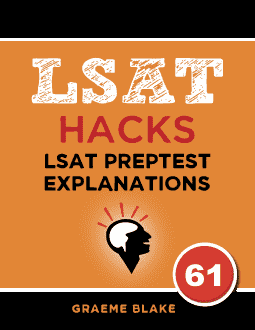QUESTION TEXT: Shark teeth are among the most common vertebrate…
QUESTION TYPE: Paradox
PARADOX: Shark teeth are common fossils, but shark skeletons aren’t common fossils.
ANALYSIS: You need to find an answer that explains a difference between shark teeth and shark skeletons. The answer should say why the teeth are common and skeletons are rare.
___________
- CORRECT. This explains everything. Cartilage doesn’t fossilize, so that explains why shark skeletons don’t fossilize much. Meanwhile, teeth fossilize more easily (including shark teeth).
- This just adds confusion. Why are teeth and skeletons found separately? This answer only raises questions.
- So? The stimulus clearly said “shark teeth are among the most common fossils….”
That means we did find shark teeth and did identify them, despite the difficulty.
If this had said shark skeletons were difficult to identify, this could have been right. - This doesn’t tell us much. It doesn’t say whether ancient sharks lost their teeth repeatedly, and it doesn’t say how many shark species have this ability. Finally, this answer gives no explanation for why shark skeletons are rare.
- We need a difference between shark teeth and shark skeletons. This answer only shows a similarity. This explains nothing.


For C, I think “difficult to distinguish” and difficult to “identify” are different. Failure to distinguish could result in categorizing more or less in number as such thing than there actually is. Whereas if something is difficult to identify, it implies we probably have known less number of this thing than there actually exists. Is this understanding correct?
But anyway, this answer choice is wrong because without knowing the situation about shark skeletons, we cannot explain the whole story. And I have doubts about Graeme’s explanation that “If this had said shark skeletons were difficult to identify, this could have been right.” Because I think we still lose the a part of the whole picture. If it is at least as difficult to identify shark teeth as shark skeletons, we would be still confused why the former is common whereas the latter is rare. However, if we change this into a comparative statement, i.e., the shark skeletons are significantly more difficult to identify than the shark teeth, I think this could be right.
I think you could use “identify” and “distinguish” interchangeably here because it’s plausible that if something is difficult or complex to identify, you might still mistakenly “over-identify” shark-teeth within the set. Just because something is difficult to identify, doesn’t necessarily mean that you’d find less of that thing in a set — you might just make more mistakes in the identification process.
Also, I agree that you should generally look for the answer choice that addresses both of the conflicting facts in Paradox questions. However, I think in a case like this, where we’re being asked how element of fossilization is rare while the other is not, we don’t necessarily need to explain why one is rare and the other is not, we just need to explain one side of the facts.
Also, we’re still looking for the answer choice that’s the best of five, and if this answer choice didn’t make a comparative statement but still provided an explanation of why fossilized shark skeletons are rare (even though fossilized shark teeth aren’t), and the other answers didn’t provide explanations of either set of facts, this could feasibly be the correct answer.